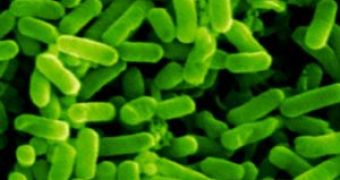We are engaged by more than 50 years in a chemical war against bacteria and diseases produced by them, from tonsillitis to typhoid fever.
But antibiotics have been losing their power ever since, with the emerging drug-resistant bacterial strains.
U.S. Food and Drug Administration have tagged drug resistance as a growing threat to human and animal health.
Bacterial diseases treatable five years ago, like tuberculosis, gonorrhea, and the ear infection, are now increasingly difficult to stop.
In the fight against bacteria, new approaches must be taken.
"Instead of killing off disease-causing bacteria, just disarm them," said bacteriologist Marcin Filutowicz, from the University of Wisconsin at Madison.
Antibiotics act like a chemical weapon: they kill off virtually every bacterium in a patient's body.
"That causes a couple of problems", Filutowicz said.
Necessary bacteria from the gut vanish (that's why we have to eat yoghurt during antibiotics cure: they reintroduce gut bacteria to the organism).
Also, eliminating body's bacteria leaves fertile ground in which new bacteria can grow, usually the ones that were strong enough to survive antibiotics.
"When you start repopulating your skin, your GI track, your nostrils, all of the non-sterile parts of your body, then opportunistic pathogens have as equal a chance of repopulating your body as the good bacteria," Filutowicz explained.
"The process of killing off vulnerable bacteria while providing territory for tough bacteria to occupy leads to drug-resistant diseases," Filutowicz said.
"But if harmful bacteria-for example, the Neisseria meningitidis that causes spinal meningitis-could be left in place, but modified so that it couldn't cause the disease, drug-resistant strains wouldn't have space in which to expand."
Bacteria store their DNA two ways: on the chromosome and on "plasmids".
Plasmids contain little DNA chunks not vital to keeping a bacteria alive, which cause their virulence (the ability of causing disease) and that harbor their immunity ("antibiotic resistance genes").
"The weapon of choice for attacking these troublesome plasmids is "displacins," which are bits of DNA from other kinds of bacteria."
Foreign displacins do not kill bacteria, but render them defenseless.
"The charm and the power of displacin technology is that you don't kill the culprit, but you disarm it," Filutowicz said.
"And because you disarm bacteria of their virulence and antibiotic resistance genes, you don't produce a void in their environment. This is critical, that you don't produce the emptiness in the environment that then can be competed for by pathogens and non-pathogens to occupy this void."
The researchers would use displacins from E. coli (photo) harmless strains.
"These E. coli will carry the bad-bacteria-busting displacins into the battlefield that is a patient's body without, Filutowicz hopes, losing the drug-resistance war."

 14 DAY TRIAL //
14 DAY TRIAL //